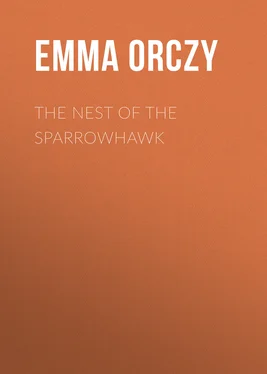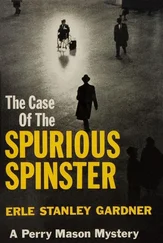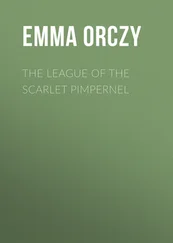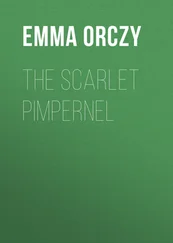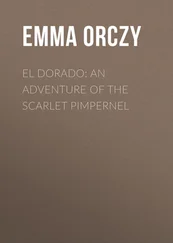Emma Orczy - The Nest of the Sparrowhawk
Здесь есть возможность читать онлайн «Emma Orczy - The Nest of the Sparrowhawk» — ознакомительный отрывок электронной книги совершенно бесплатно, а после прочтения отрывка купить полную версию. В некоторых случаях можно слушать аудио, скачать через торрент в формате fb2 и присутствует краткое содержание. Жанр: Альтернативная история, foreign_antique, foreign_prose, Исторические приключения, на английском языке. Описание произведения, (предисловие) а так же отзывы посетителей доступны на портале библиотеки ЛибКат.
- Название:The Nest of the Sparrowhawk
- Автор:
- Жанр:
- Год:неизвестен
- ISBN:нет данных
- Рейтинг книги:5 / 5. Голосов: 1
-
Избранное:Добавить в избранное
- Отзывы:
-
Ваша оценка:
- 100
- 1
- 2
- 3
- 4
- 5
The Nest of the Sparrowhawk: краткое содержание, описание и аннотация
Предлагаем к чтению аннотацию, описание, краткое содержание или предисловие (зависит от того, что написал сам автор книги «The Nest of the Sparrowhawk»). Если вы не нашли необходимую информацию о книге — напишите в комментариях, мы постараемся отыскать её.
The Nest of the Sparrowhawk — читать онлайн ознакомительный отрывок
Ниже представлен текст книги, разбитый по страницам. Система сохранения места последней прочитанной страницы, позволяет с удобством читать онлайн бесплатно книгу «The Nest of the Sparrowhawk», без необходимости каждый раз заново искать на чём Вы остановились. Поставьте закладку, и сможете в любой момент перейти на страницу, на которой закончили чтение.
Интервал:
Закладка:
Perhaps there was just a curious note of irritability in Sir Marmaduke's voice as he spoke of this mysterious inhabitant of the quiet village of Acol; certain it is that the two matchmaking old dames seemed smitten at one and the same time with a sense of grave danger to their schemes.
An exile from France, a prince who hides his identity and his person in a remote Kentish village, and a girl with a highly imaginative temperament like Lady Sue! here was surely a more definite, a more important rival to the pretensions of homely country youths like Sir Timothy Harrison or Squire Pyncheon, than even the student of humble origin whose brother was a blacksmith, whose aunt was a Quakeress, and who wandered about the park of Acol with hollow eyes fixed longingly on the much-courted heiress.
Dame Harrison and Mistress Pyncheon both instinctively turned a scrutinizing gaze on her ladyship. Neither of them was perhaps ordinarily very observant, but self-interest had made them keen, and it would have been impossible not to note the strange atmosphere which seemed suddenly to pervade the entire personality of the young girl.
There was nothing in her face now expressive of whole-hearted partisanship for an absent friend, such as she had displayed when she felt that young Lambert was being unjustly sneered at; rather was it a kind of entranced and arrested thought, as if her mind, having come in contact with one all-absorbing idea, had ceased to function in any other direction save that one.
Her cheeks no longer glowed, they seemed pale and transparent like those of an ascetic; her lips were slightly parted, her eyes appeared unconscious of everything round her, and gazing at something enchanting beyond that bank of clouds which glimmered, snow-white, through the trees.
"But what in the name of common sense is a French prince doing in Acol village?" ejaculated Dame Harrison in her most strident voice, which had the effect of drawing every one's attention to herself and to Sir Marmaduke, whom she was thus addressing.
The men ceased playing and gathered nearer. The spell was broken. That strange and mysterious look vanished from Lady Sue's face; she turned away from the speakers and idly plucked a few bunches of acorn from an overhanging oak.
"Of a truth," replied Sir Marmaduke, whose eyes were still steadily fixed on his ward, "I know as little about the fellow, ma'am, as you do yourself. He was exiled from France by King Louis for political reasons, so he explained to the old woman Lambert, with whom he is still lodging. I understand that he hardly ever sleeps at the cottage, that his appearances there are short and fitful and that his ways are passing mysterious. . . . And that is all I know," he added in conclusion, with a careless shrug of the shoulders.
"Quite a romance!" remarked Mistress Pyncheon dryly.
"You should speak to him, good Sir Marmaduke," said Dame Harrison decisively, "you are a magistrate. 'Tis your duty to know more of this fellow and his antecedents."
"Scarcely that, ma'am," rejoined Sir Marmaduke, "you understand . . . I have a young ward living for the nonce in my house . . . she is very rich, and, I fear me, of a very romantic disposition . . . I shall try to get the man removed from hence, but until that is accomplished, I prefer to know nothing about him . . ."
"How wise of you, good Sir Marmaduke!" quoth Mistress Pyncheon with a sigh of content.
A sentiment obviously echoed in the hearts of a good many people there present.
"One knows these foreign adventurers," concluded Sir Marmaduke with pleasant irony, "with their princely crowns and forlorn causes . . . half a million of English money would no doubt regild the former and bolster up the latter."
He rose from his seat as he spoke, boldly encountering even as he did so, a pair of wrathful and contemptuous girlish eyes fixed steadily upon him.
"Shall we go within?" he said, addressing his guests, and returning his young ward's gaze haughtily, even commandingly; "a cup of sack-posset will be welcome after the fatigue of the game. Will you honor my poor house, mistress? and you, too, ma'am? Gentlemen, you must fight among yourselves for the privilege of escorting Lady Sue to the house, and if she prove somewhat disdainful this beautiful summer's afternoon, I pray you remember that faint heart never won fair lady, and that the citadel is not worth storming an it is not obdurate."
The suggestion of sack-posset proved vastly to the liking of the merry company. Mistress de Chavasse who had been singularly silent all the afternoon, walked quickly in advance of her brother-in-law's guests, no doubt in order to cast a scrutinizing eye over the arrangements of the table, which she had entrusted to the servants.
Sir Marmaduke followed at a short distance, escorting the older women, making somewhat obvious efforts to control his own irritability, and to impart some sort of geniality to the proceedings.
Then in a noisy group in the rear came the three men still fighting for the good graces of Lady Sue, whilst she, silent, absorbed, walked leisurely along, paying no heed to the wrangling of her courtiers, her fingers tearing up with nervous impatience the delicate cups of the acorns, which she then threw from her with childish petulance.
And her eyes still sought the distance beyond the boundaries of Sir Marmaduke's private grounds, there where cornfields and sky and sea were merged by the summer haze into a glowing line of emerald and purple and gold.
CHAPTER IV
GRINDING POVERTY
It was about an hour later. Sir Marmaduke's guests had departed, Dame Harrison in her rickety coach, Mistress Pyncheon in her chaise, whilst Squire Boatfield was riding his well-known ancient cob.
Everyone had drunk sack-posset, had eaten turkey pasties, and enjoyed the luscious fruit: the men had striven to be agreeable to the heiress, the old ladies to be encouraging to their protégés. Sir Marmaduke had tried to be equally amiable to all, whilst favoring none. He was an unpopular man in East Kent and he knew it, doing nothing to counterbalance the unpleasing impression caused invariably by his surly manner, and his sarcastic, often violent, temper.
Mistress Amelia Editha de Chavasse was now alone with her brother-in-law in the great bare hall of the Court, Lady Sue having retired to her room under pretext of the vapors, and young Lambert been finally dismissed from work for the day.
"You are passing kind to the youth, Marmaduke," said Mistress de Chavasse meditatively when the young man's darkly-clad figure had disappeared up the stairs.
She was sitting in a high-backed chair, her head resting against the carved woodwork. The folds of her simple gown hung primly round her well-shaped figure. Undoubtedly she was still a very good-looking woman, though past the hey-day of her youth and beauty. The half-light caused by the depth of the window embrasure, and the smallness of the glass panes through which the summer sun hardly succeeded in gaining admittance, added a certain softness to her chiseled features, and to the usually hard expression of her large dark eyes.
She was gazing out of the tall window, wherein the several broken panes were roughly patched with scraps of paper, out into the garden and the distance beyond, where the sea could be always guessed at, even when not seen. Sir Marmaduke had his back to the light: he was sitting astride a low chair, his high-booted foot tapping the ground impatiently, his fingers drumming a devil's tattoo against the back of the chair.
"Lambert would starve if I did not provide for him," he said with a sneer. "Adam, his brother, could do naught for him: he is poor as a church-mouse, poorer even than I—but nathless," he added with a violent oath, "it strikes everyone as madness that I should keep a secretary when I scarce can pay the wages of a serving maid."
Читать дальшеИнтервал:
Закладка:
Похожие книги на «The Nest of the Sparrowhawk»
Представляем Вашему вниманию похожие книги на «The Nest of the Sparrowhawk» списком для выбора. Мы отобрали схожую по названию и смыслу литературу в надежде предоставить читателям больше вариантов отыскать новые, интересные, ещё непрочитанные произведения.
Обсуждение, отзывы о книге «The Nest of the Sparrowhawk» и просто собственные мнения читателей. Оставьте ваши комментарии, напишите, что Вы думаете о произведении, его смысле или главных героях. Укажите что конкретно понравилось, а что нет, и почему Вы так считаете.
